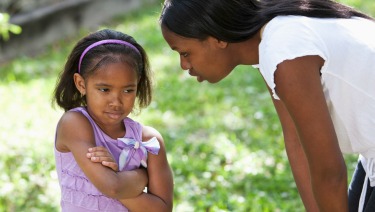Family Trying to Control How I Raise My Child
Family Life
What's the Best Way to Discipline My Child?


Page Content
As a parent, 1 of your jobs to teach your child to conduct. It's a job that takes time and patience. Only, information technology helps to larn the effective and good for you subject field strategies.
Here are some tips from the American Academy of Pediatrics (AAP) on the best means to help your kid learn acceptable behavior as they abound.
10 Healthy Subject area Strategies That Work
The AAP recommends positive discipline strategies that finer teach children to manage their behavior and proceed them from harm while promoting healthy development. These include:
-
Testify and tell. Teach children right from wrong with at-home words and actions. Model behaviors yous would like to see in your children.
-
Set limits. Have clear and consistent rules your children can follow. Exist sure to explain these rules in age-appropriate terms they tin can understand.
-
Give consequences. Calmly and firmly explain the consequences if they don't behave. For example, tell her that if she does not pick up her toys, you volition put them abroad for the rest of the 24-hour interval. Exist prepared to follow through right away. Don't requite in by giving them back after a few minutes. Merely recollect, never accept away something your child truly needs, such as a repast.
-
Hear them out. Listening is important. Let your kid stop the story before helping solve the problem. Lookout man for times when misbehavior has a design, similar if your child is feeling jealous. Talk with your child about this rather than just giving consequences.
-
Give them your attending. The most powerful tool for effective discipline is attention—to reinforce adept behaviors and discourage others. Remember, all children want their parent's attention.
-
Grab them being proficient. Children need to know when they practise something bad--and when they practice something good. Discover skillful behavior and indicate it out, praising success and good tries. Be specific (for example, "Wow, you did a good chore putting that toy away!").
-
Know when not to reply. Equally long every bit your child isn't doing something dangerous and gets plenty of attention for skillful behavior, ignoring bad behavior tin can be an effective way of stopping it. Ignoring bad beliefs tin also teach children natural consequences of their actions. For example, if your kid keeps dropping her cookies on purpose, she will soon have no more cookies left to eat. If she throws and breaks her toy, she volition not be able to play with it. It will not exist long earlier she learns not to drib her cookies and to play carefully with her toys.
-
Be prepared for trouble. Plan ahead for situations when your child might take problem behaving. Fix them for upcoming activities and how yous want them to behave.
-
Redirect bad behavior. Sometimes children misbehave because they are bored or don't know any better. Detect something else for your kid to do.
-
Call a time-out. A fourth dimension-out can be especially useful when a specific rule is broken. This subject field tool works best by warning children they will get a time out if they don't terminate, reminding them what they did wrong in as few words―and with as little emotion―as possible, and removing them from the situation for a pre-set up length of time (one minute per year of age is a skillful dominion of thumb). With children who are at least 3 years erstwhile, you can try letting their children pb their own time-out instead of setting a timer. You can just say, "Go to time out and come back when you feel ready and in command." This strategy, which can help the child acquire and practice cocky-management skills, also works well for older children and teens.
Spanking and Harsh Words are Harmful and Don't Piece of work. Here's Why: |
|---|
Acquire from Mistakes—Including Your Ain
Remember that, as a parent, y'all can give yourself a time out if you feel out of control. Just make sure your kid is in a safe place, and then give yourself a few minutes to take a few deep breaths, relax or call a friend. When you are feeling better, become back to your child, hug each other, and start over.
If you lot exercise not handle a situation well the offset time, try not to worry about information technology. Think about what you could take washed differently and try to do it the next time. If y'all feel you lot have made a existent mistake in the heat of the moment, look to cool downwardly, apologize to your kid, and explicate how you will handle the situation in the future. Be sure to keep your promise. This gives your child a skilful model of how to recover from mistakes.
Healthy & Effective Subject Tips by Age/Stage
Infants |
|
|---|---|
Toddlers |
|
Preschool Age |
|
Gradeschool-Historic period Children |
|
Adolescents & Teens |
|
Additional Information:
- 15 Tips to Survive the Terrible 3's
-
How to Shape and Manage Your Immature Child's Behavior
-
Disciplining Older Children
-
How to Give a Time-Out
-
Effective Bailiwick to Raise Good for you Children (AAP Policy Statement)
Commodity Torso
- Last Updated
- 11/five/2018
- Source
- American University of Pediatrics (Copyright © 2018)
The information contained on this Web site should non be used as a substitute for the medical intendance and advice of your pediatrician. There may exist variations in handling that your pediatrician may recommend based on private facts and circumstances.
Source: https://healthychildren.org/English/family-life/family-dynamics/communication-discipline/Pages/Disciplining-Your-Child.aspx
0 Response to "Family Trying to Control How I Raise My Child"
Post a Comment